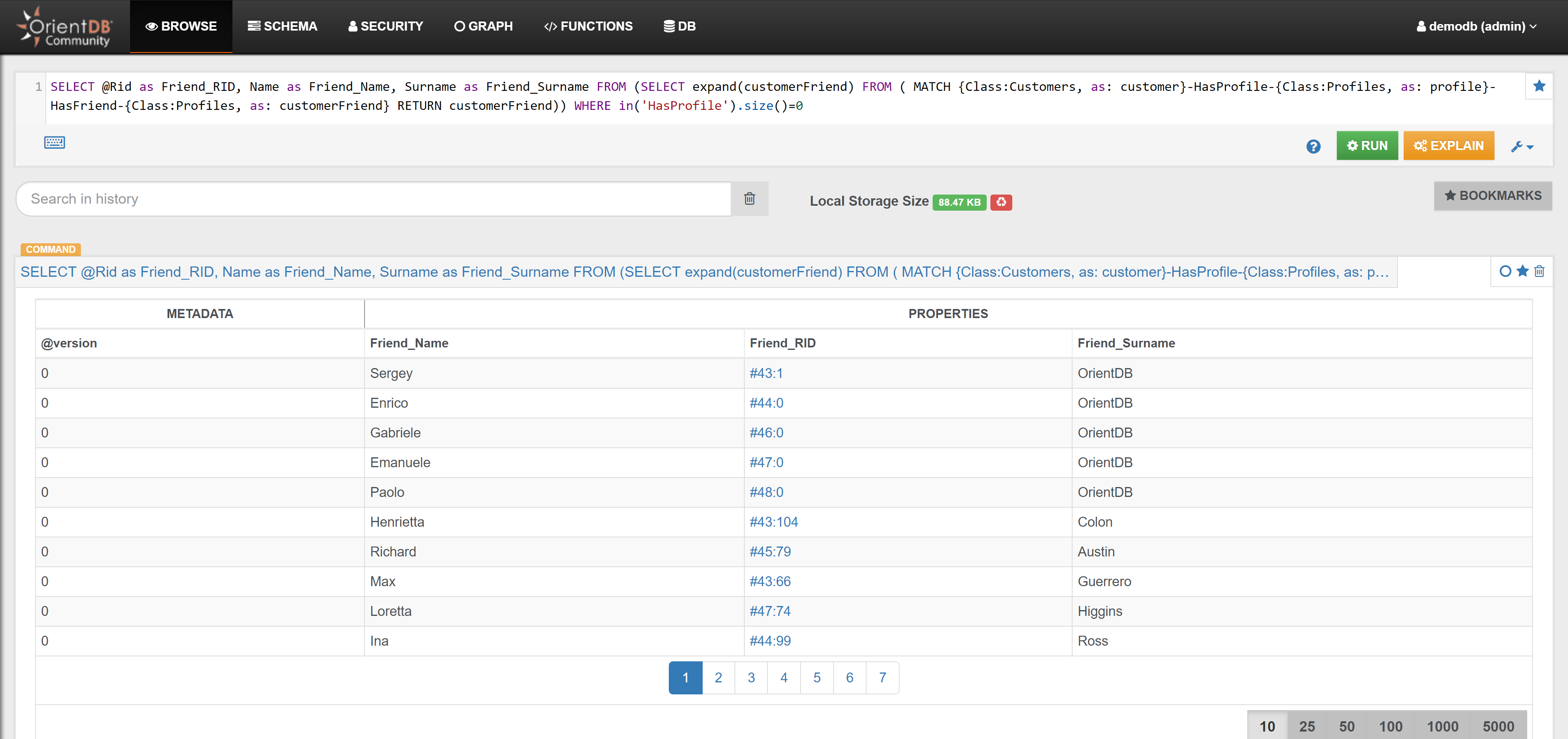Friendship
Example 1
Find Santo’s Friends:
MATCH {Class: Profiles, as: profile, where: (Name='Santo' AND Surname='OrientDB')}-HasFriend-{Class: Profiles, as: friend}
RETURN $pathelements
In the Graph Editor included in Studio, using ‘RETURN $pathelements’ as RETURN clause, this is the obtained graph:

In the Browse Tab of Studio, using ‘RETURN friend.@Rid as Friend_RID, friend.Name as Friend_Name, friend.Surname as Friend_Surname’ as RETURN clause, this is the obtained list of records (only few records are shown in the image below):

If you would like only to count them, you can execute a query like the following:
SELECT COUNT(*)
FROM (
MATCH {Class: Profiles, as: profile, where: (Name='Santo' AND Surname='OrientDB')}-HasFriend-{Class: Profiles, as: friend}
RETURN friend
)
or
SELECT
both('HasFriend').size() AS FriendsNumber
FROM `Profiles`
WHERE Name='Santo' AND Surname='OrientDB'
Example 2
Find Santo’s Friends who are also Customers:
MATCH {Class: Profiles, as: profile, where: (Name='Santo' AND Surname='OrientDB')}-HasFriend-{Class: Profiles, as: friend}<-HasProfile-{class: Customers, as: customer}
RETURN $pathelements
In the Graph Editor included in Studio, using ‘RETURN $pathelements’ as RETURN clause, this is the obtained graph:
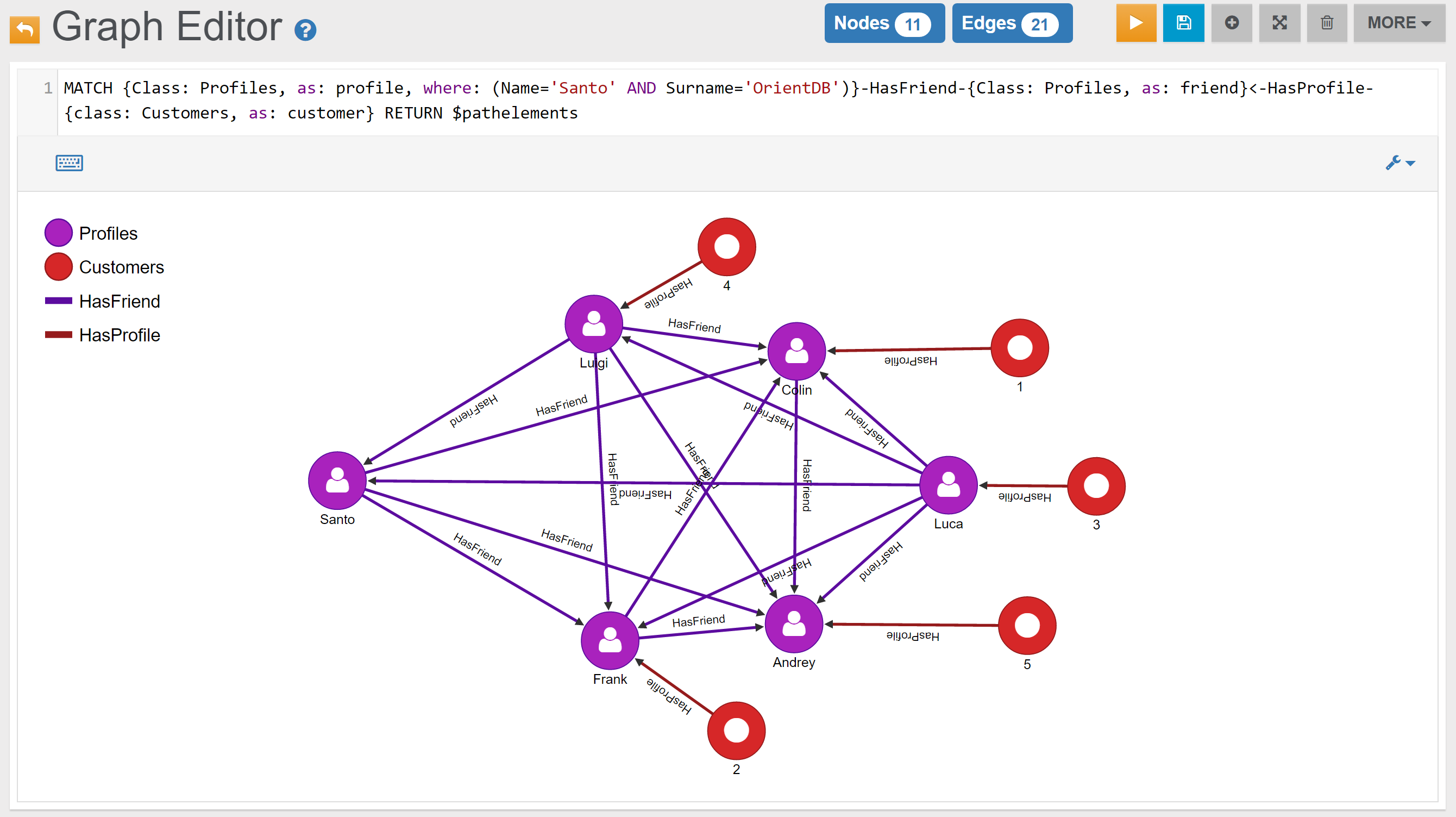
In the Browse Tab of Studio, using ‘RETURN friend.@Rid as Friend_RID, friend.Name as Friend_Name, friend.Surname as Friend_Surname, customer.@Rid as Customer_RID, customer.OrderedId as Customer_OrederedId’ as RETURN clause, this is the obtained list of records (only few records are shown in the image below):
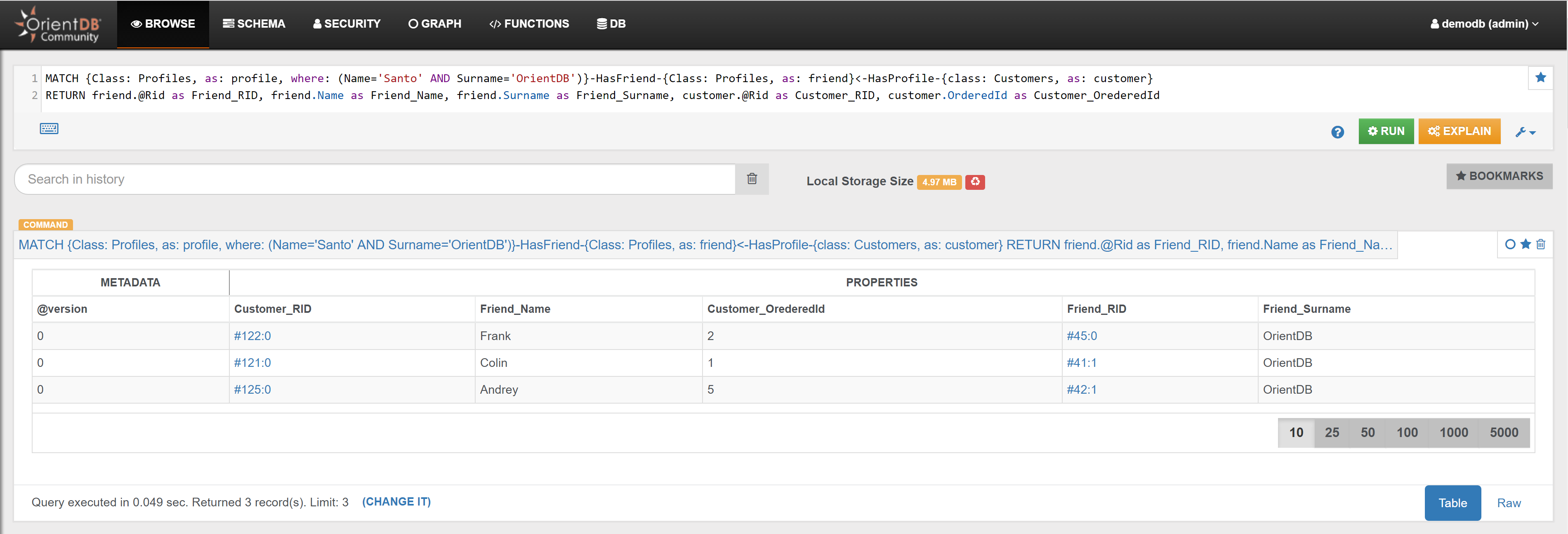
Example 3
{% include “./include-file-5.md” %}
Example 4
Find Santo’s Friends who are also Customers, and the Orders they have placed:
MATCH {Class: Profiles, as: profile, where: (Name='Santo' AND Surname='OrientDB')}-HasFriend-{Class: Profiles, as: friend}<-HasProfile-{class: Customers, as: customer}<-HasCustomer-{Class: Orders, as: order}
RETURN $pathelements
In the Graph Editor included in Studio, using ‘RETURN $pathelements’ as RETURN clause, this is the obtained graph:
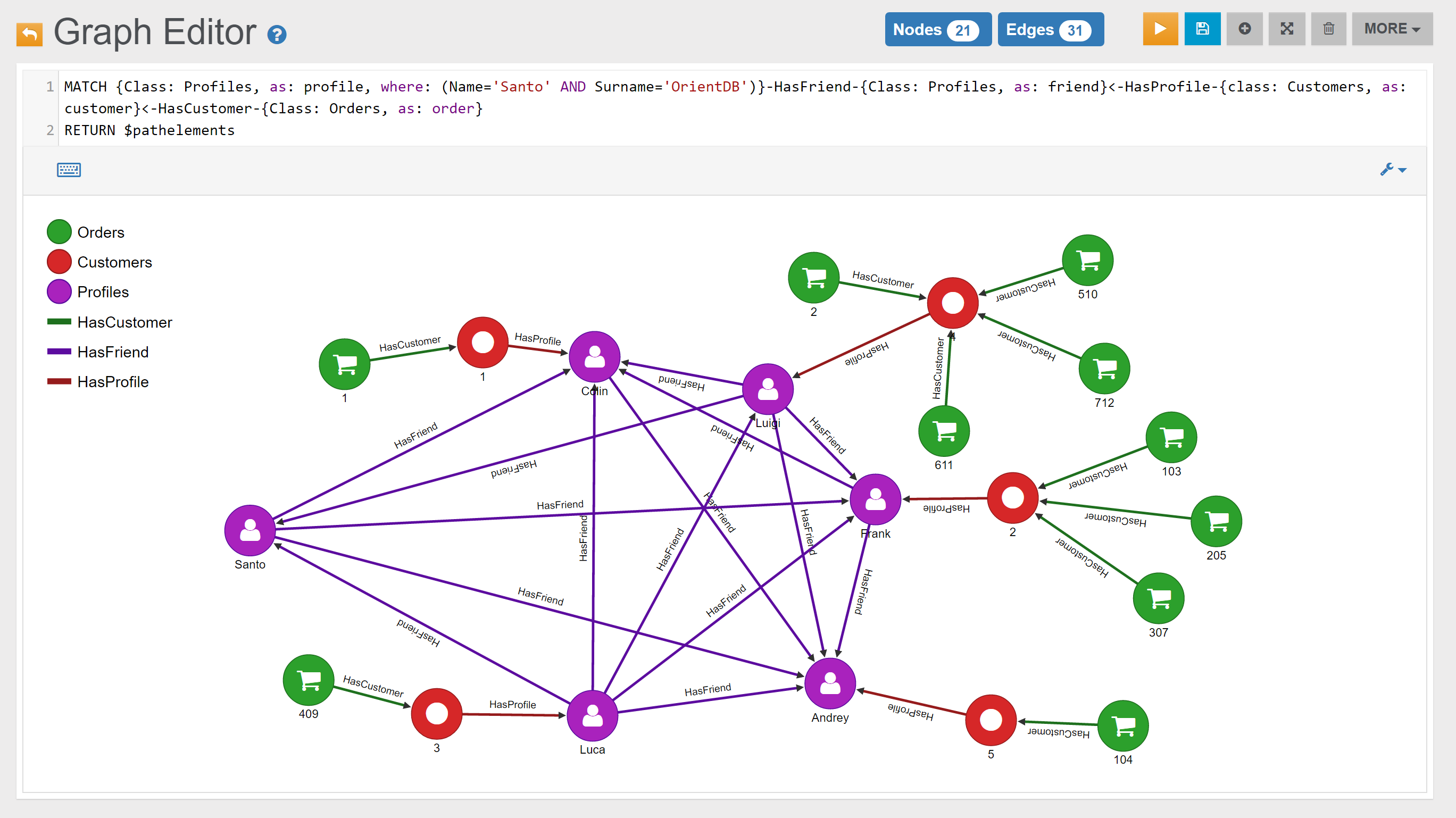
In the Browse Tab of Studio, using ‘RETURN friend.@Rid as Friend_RID, friend.Name as Friend_Name, friend.Surname as Friend_Surname, customer.@Rid as Customer_RID, customer.OrderedId as Customer_OrederedId, order.Id as OrderId’ as RETURN clause, this is the obtained list of records (only few records are shown in the image below):

Example 5
Among Santo’s Friends, find the top 3 Customers that placed the highest number of Orders:
SELECT
OrderedId as Customer_OrderedId,
in('HasCustomer').size() as NumberOfOrders,
out('HasProfile').Name as Friend_Name,
out('HasProfile').Surname as Friend_Surname
FROM (
SELECT expand(customer)
FROM (
MATCH {Class: Profiles, as: profile, where: (Name='Santo' AND Surname='OrientDB')}-HasFriend-{Class: Profiles, as: friend}<-HasProfile-{class: Customers, as: customer}
RETURN customer
)
)
ORDER BY NumberOfOrders DESC
LIMIT 3
In the Browse Tab of Studio, using the query above, this is the obtained list of records:

Example 6
Among Santo’s Friends, find the top 3 Customers that visited the highest number of Places:
SELECT
OrderedId as Customer_OrderedId,
out('HasVisited').size() as NumberOfVisits,
out('HasProfile').Name as Friend_Name,
out('HasProfile').Surname as Friend_Surname
FROM (
SELECT expand(customer)
FROM (
MATCH {Class: Profiles, as: profile, where: (Name='Santo' AND Surname='OrientDB')}-HasFriend-{Class: Profiles, as: friend}<-HasProfile-{class: Customers, as: customer}
RETURN customer
)
)
ORDER BY NumberOfVisits DESC
LIMIT 3
In the Browse Tab of Studio, using the query above, this is the obtained list of records:

You may find in a similar way the top 3 Customers, among Santo’s Friends, that have stayed at the highest number of Hotels, or have eaten at the highest number of Restaurants. Just use out("HasStayed").size() or out("HasEaten").size() instead of out("HasVisited").size() (you may also consider to modify the alias, from NumberOfVisits to NumberOfHotels and NumberOfRestaurants, so that it is more coherent to these cases).
Example 7
{% include “./include-file-1.md” %}
or, without restricting to a specific customer:
Find all the Customer Friends that are not Customers (so that a product can be proposed):
In the Graph Editor included in Studio, using the query below, this is the obtained graph:
SELECT *
FROM (
SELECT expand(customerFriend)
FROM (
MATCH {Class:Customers, as: customer}-HasProfile-{Class:Profiles, as: profile}-HasFriend-{Class:Profiles, as: customerFriend}
RETURN customerFriend
)
)
WHERE in('HasProfile').size()=0
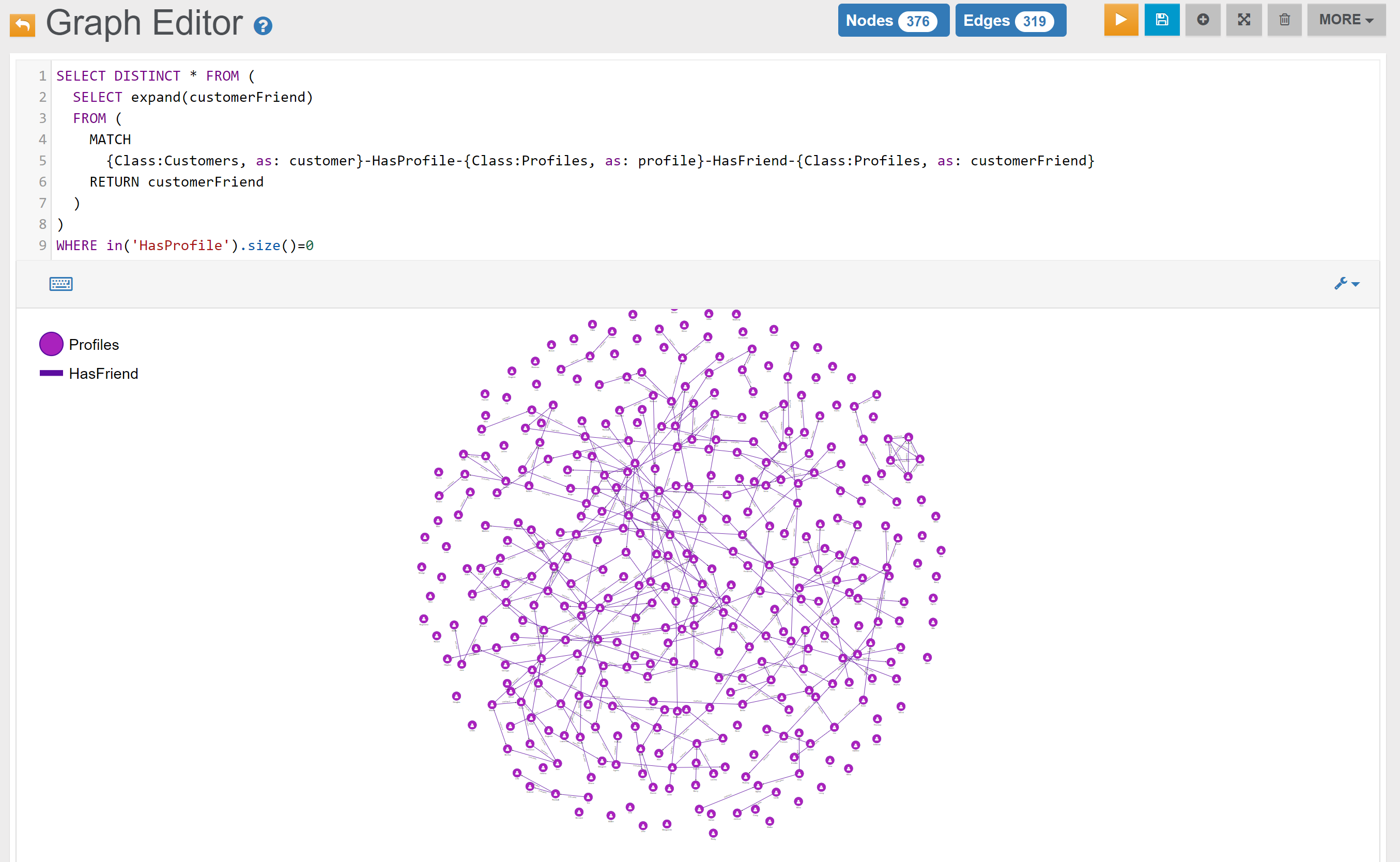
In the Browse Tab of Studio, using the query below, this is the obtained list of records (only few records are shown in the image below):
SELECT
@Rid as Friend_RID,
Name as Friend_Name,
Surname as Friend_Surname
FROM (
SELECT expand(customerFriend)
FROM (
MATCH {Class:Customers, as: customer}-HasProfile-{Class:Profiles, as: profile}-HasFriend-{Class:Profiles, as: customerFriend}
RETURN customerFriend
)
)
WHERE in('HasProfile').size()=0
